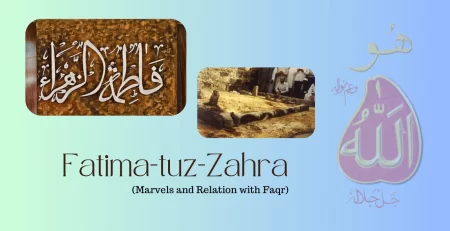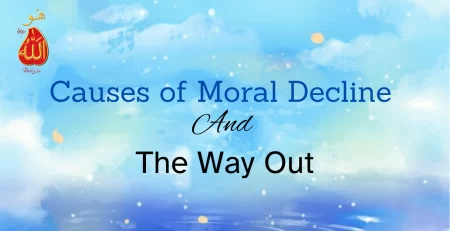The Afterlife: Where Life Continues Beyond Death
Summary:
Death is inevitable, as stated in Quran, “Every soul is going to taste death” (3:185). This undeniable truth transcends all living beings, but what follows after death is something we, as Muslims, firmly believe in – life beyond the grave. The afterlife, where every deed will be accounted for, is central to Islamic belief, as our eternal fate rests on how we live in this temporary world. Despite the fleeting nature of this life, many Muslims are heedless of death, often distracted by worldly desires, forgetting to prepare for the inevitable.
The first stop in the afterlife is the grave – a boundary between the physical and spiritual worlds. While the deceased’s body undergoes visible rituals (bathing, funeral prayers, and burial) their soul embarks on a profound journey in the spiritual realm. Only the deceased knows what occurs, though Allah sometimes shares these secrets with His close men. As the soul transitions, angels begin questioning the person, testing their faith and deeds.
The process begins with Angel Azrael, who gathers the soul from the body. The soul is then questioned, first by Azrael, followed by angels Munkar and Nakir in the grave. They ask key questions about one’s faith and life: Who is your Lord? What is your religion? Who is your Prophet? Based on the answers, the soul’s destiny is decided. A righteous soul ascends to “Illiyeen” (heavenly realms), while an unfortunate soul descends to “Sijjeen” (a place of torment). The state of the grave reflects this – either a garden of paradise or a pit of hell.
Interestingly, Angel Ruman plays a role by recording the person’s deeds using the shroud as paper. This record is wrapped around the soul, a mark of its earthly actions. Over time, the soul returns to the grave, witnessing the decay of the body and lamenting the worldly indulgences that have now turned to dust.
Prophet Musa’s story offers a glimpse into the inevitability of death. When the Angel of Death appeared before him, he resisted at first, knocking out the angel’s eye. However, after Allah restored the angel, Musa accepted death, understanding that no matter how much life is extended, death cannot be avoided. Quran echoes this reality as: “Whoever is on the earth will perish. And the essence of your Lord, Who is the Master of glory and splendour and the Master of bounty and honour, will remain” (55: 26-27).
Islamic teachings continually remind believers of the transient nature of this world. Prophet Mohammad emphasised living as though we are travellers in this world, urging believers to prepare for the afterlife rather than becoming too attached to worldly comforts. Sufis, like Imam Ghazali and Sultan Bahoo have long reflected on the gravity of death, urging us to constantly remember it and seek refuge from the punishments of the grave.
In summary, death is not the end but the beginning of the real, eternal life. The deeds performed in this world shape the soul’s experience in the afterlife. Whether one’s grave becomes a place of peace or torment depends entirely on how they live according to Allah’s guidance. This article serves as a reminder of our temporary stay on earth and the importance of preparing for what lies beyond. Let this reality sink in – our eternal destination is determined by our actions today.
The Afterlife: Where Life Continues Beyond Death
The departure of the soul from this physical body is called death, and it is an undeniable truth. Every living being must taste it, as Allah says in Quran:
كُلُّ نَفْسٍ ذَآىِٕقَةُ الْمَوْتِ ؕ
Meaning: Every soul is going to taste death. (3: 185)
There is no living being for whom death does not exist. As Muslims, we firmly believe and have faith that after death, we will be resurrected and presented before Allah, where the deeds, good and bad, of a person’s worldly life will be accounted for. All Divine religions believe in resurrection after death, except for certain religions that emerged in this world.
However, even in the present times, the situation has become such that the majority of Muslims have become heedless of death. The love for worldly wealth and possessions has made them forget death. They lack awareness of the life after death and its preparation. While this worldly life is only temporary, the real life begins after death which has no end. However, the entire outcome of the afterlife depends on how this worldly life is lived. The more this life is spent according to the way prescribed by Allah and His Messenger (pbuh), the better the afterlife will be. This is why the world is referred to as the field for the hereafter.
Grave is a Partition between Physical and Spiritual Realms
After death, a person’s first destination is their grave. Outwardly, the grave appears to be a simple pit of earth, but in reality, it is a barrier or partition between the physical and spiritual realms. From the outside, we see the deceased being bathed, the funeral prayer being offered, and the body being laid to rest in the grave. However, what is happening to the deceased in the spiritual world is something only the deceased is aware of. It cannot be perceived by the human eye. However, Allah informs His pious and close servants, who are familiar with Divine secrets, about these conditions. Sultan Bahoo describes the state of agony and death in the following way:
Questioning at the time of Death
Know that at the time of death, the angel Azrael shakes the soul of life from all seven limbs of the body, from head to toe, just as butter is churned from milk. Similarly, Azrael gathers the person’s soul into the head at the place known as the “Astakhwan al-abyadh” which is vaster than the earth and the heavens. In this place, the angel stands the human soul up and asks it 370 questions. Afterward, the deceased is bathed by the washer, and the funeral prayer is offered. On the way to the grave, an additional 370 questions are asked of the deceased. Once lowered into the grave, the angels Munkar and Nakir question the person.
Angel Ruman Writes the Deeds
After answering Munkar and Nakir’s questions, an angel named Ruman comes and sits by the corpse in the grave. He uses his finger as a pen, his mouth as an inkpot, his saliva as ink, and the shroud as paper to write down the person’s good and bad deeds.
He then folds this record into a talisman and ties it around the person’s neck, after which the angel disappears. If the soul is righteous, it ascends to the place of “Illiyeen,”. If it is wicked and unfortunate, it descends to the place of “Sijjeen.” Three days later, the soul returns to the grave and sees its body being eaten by worms and decaying, becoming foul and putrid. Upon seeing this state, the soul begins to weep, and in sorrow and sadness, laments with great regret, saying, “O body, raised in wealth and luxury! I now see you afflicted with filth and ruin.” For twelve years, the soul continues to visit its body in the grave, just as one visits a sick person to check on them
گر بہ بینی حال احوال از قبر
می شود مکشوف زیر و با زبر
بعد ازاں عبرت خوری باغم تمام
دِل سلیم و گشت واضح ہر مقام
Gar ba beeni haal ahwaal az qabr
Me shavad makshoof zaero ba zabar
Ba’ad azaan ibrat khori ba gham tamaam
Dil-e-saleem o gasht waazeh har maqam
Explanation: If you were to witness the conditions of the grave, all the hidden realities would be revealed to you. Then, even in the deepest sorrow, you would gain lessons of wisdom. Your heart would adopt submission and contentment, and the truth of all spiritual stations would become clear to you.(Nur-ul-Huda Kalan)
Death Is Inevitable
Death is the inevitable destination from which no one can escape. Whoever has come to this temporary abode, i.e. the world, must return and to do so they must pass through the stage of death.
Incident of Prophet Musa
There is a well-known story related to death involving Prophet Musa (Moses). In Sahih Bukhari, it is narrated by Abu Hurairah (RA) that the Holy Prophet (pbuh) said:
The Angel of Death, Azrael was sent to Prophet Musa AS) in human form. When he arrived, Musa struck him with a strong blow, which knocked out his eye. Azrael returned to Allah and said, “O Allah! You sent me to a servant who does not want to die.” Allah restored his eye as it was before and said, “Go back and tell him to place his hand on the back of an ox. For every hair that his hand covers, he will be granted one year of life.” When this message reached Musa, he asked, “O Allah! What will happen after that?” Allah replied, “Death will still come.” Musa then said, “So let it come now.”
(Sahih Bukhari, 1339)
Thus, no living being can be spared from the agony of death. Whether one holds a high rank in this world or is extremely close to Allah, no one is granted eternity or permanence, except for Allah Himself. As Allah Almighty states:
كُلُّ مَنْ عَلَیْهَا فَانٍۚۖ وَّ یَبْقٰی وَجْهُ رَبِّكَ ذُو الْجَلٰلِ وَ الْاِكْرَامِۚ
Meaning: Whoever is on the earth will perish. And the Essence of your Lord, Who is the Master of glory and splendour and the Master of bounty and honour, will remain. (55: 26-27)
Man Becomes Engrossed in Earthly Desires
It is the human being who becomes so engrossed in this world that they forget about death. While causing harm or deceiving others, a person does not think about the fact that they will have to stand before Allah. Yet, as Muslims, we believe that there is no fixed time for death – it can come at any moment.
Abu Hurairah narrated that the Holy Prophet said:
“There are five keys of the unseen, which no one knows except Allah. No one knows what will happen tomorrow, no one knows what is in the womb, no one knows what they will earn tomorrow, no one knows in which land they will die, and no one knows when it will rain.”
(Sahih Bukhari, 1039)
It is narrated from Aisha bint Abu Bakr that when the Holy Prophet arrived in Madina, Abu Bakr Siddiq and Bilal fell ill with fever. Abu Bakr Siddiq would recite a verse of poetry, the meaning of which is: “Every person wakes up in the morning among their family, yet their death is closer than the strap of their sandal.”
(Sahih Bukhari, 1889)
Humans are so consumed by the desire for wealth that they tirelessly strive to make their worldly life easier, but they do not care even a bit for their afterlife, which is eternal and everlasting. Even though Allah has already written everything destined for them before their birth, and they will inevitably receive it.
Sustenance is Written Before Birth
(Sahih Bukhari, 6595)
If a person were to know what will happen to them after death, the punishment they will face for each of their sins, and what encounters they will have in the grave, they would tremble in fear every moment. When Uthman Ghani would stop at a graveyard, he would weep so much that his beard would become wet. Someone asked him why he did not weep when the mention of Paradise and Hell was made, yet cried so much upon seeing the grave. He replied that the Messenger of Allah said, “The grave is the first stage of the hereafter. If one is saved from the punishment of the grave, the subsequent stages will be easier for them. But if one is not saved from the punishment of the grave, the later stages will be much more difficult.”(Sahih Bukhari, 2308)
Hadith about the Punishment of Grave
It is narrated from Barra bin Azib that he said, “We went out with the Messenger of Allah for the funeral of one of the Ansar. When we reached the grave, it had not yet been prepared, so the Messenger of Allah sat down, and we sat around him as if birds were perched on our heads. The Holy Prophet had a stick in his hand with which he was scratching the ground. Then he raised his head and said, ‘Seek refuge with Allah from the punishment of the grave,’ and he repeated it two or three times.
He then mentioned that the deceased hears the sound of their shoes as the people turn to leave. At that time, they are asked, ‘Who is your Lord? What is your religion? Who is your Prophet?’ According to the narration of Hunaad, the Prophet said that two angels come to him, seat him, and ask him, ‘Who is your Lord?’ He replies, ‘My Lord is Allah.’ They ask him, ‘What is your religion?’ He says, ‘My religion is Islam.’ Then they ask, ‘Who is this man who was sent among you?’ He replies, ‘He is the Messenger of Allah.’ They ask, ‘How did you know this?’ He says, ‘I read the Book of Allah and believed in it and regarded it as true.’
The Holy Prophet then said, ‘A caller from the heavens calls out, “My servant has spoken the truth, so prepare for him a bed in Paradise, open a door for him to Paradise, and dress him in the garments of Paradise.” Then the breeze and fragrance of Paradise begin to come to him, and his grave is widened to the extent of his sight.
State of a Disbeliever in Grave
(Sunan Abu Dawood, 4753)
In summary, the grave is one of the gardens of Paradise or one of the pits of Hell. For this reason, the Messenger of Allah used to seek refuge with Allah from the punishment of the grave. Aisha bint Abu Bakr asked the Messenger of Allah about the punishment of the grave, and he replied that indeed, the punishment of the grave is true. Aisha stated that she never saw the Holy Prophet perform any prayer without seeking refuge from the punishment of the grave in it.(Sahih Bukhari, 1372)
Abu Huraira narrated that the Messenger of Allah said, “O Allah! I seek refuge with You from the punishment of the grave, and from the punishment of Hell, and from the trials of life and death, and from the affliction of the blind Dajjal.”(Sahih Bukhari, 1377)
As for what will happen after death, that’s a distant thought; if a person were to feel the pain of death, they would forget every other suffering.Prophet Mohammad’s Last Moments
(Sahih Bukhari, 6510)
World is a Place of Test
(Sahih Bukhari, 6416)
Anas narrates that the Holy Prophet drew several lines and said, “This is hope, and this is death.” A person remains in such a state that the line closest to him (meaning death) reaches him.(Sahih Bukhari, 6418)
Imam Ghazali’s Advice About Remembering Death
(Ihya Ulum al-Din, Volume Four)
Sayings of Muslim Sages about Death
Imam Ghazali has recorded the sayings of the elders regarding the mention of death in his work Ihya Ulum al-Din, of which a few are noted here:
- Imam Hasan said, “I have not seen a wise person who is not frightened and saddened by death.”
- Umar ibn Abdul Aziz would gather the scholars every night, and together they would discuss death, the Day of Resurrection, and the hereafter, crying as if a funeral were in front of them.
- Ka’b said, “For the person who knows the reality of death, the troubles and anxieties of this world become easy.”
- Hassan of Basra said, “Death has disgraced this world and left no part of joy for the wise.” Ash’at said that whenever we would visit Hassan of Basra, he would meet us while discussing Hell, the hereafter, and death.
- Ibrahim al-Taimi said that two things have cut off the pleasures of this world for me: the remembrance of death and the thought of standing before Allah.
- When the death of Prophet Dawood and the Day of Resurrection were mentioned, his joints would become weak. But when the mercy of Allah was mentioned, he would return to his true state.
- When the mention of death was made in front of Prophet Isa, his skin would burst with fear, and blood would begin to flow.
Worldly Life is Transient
دنیا یک دم بود یک ساعتش
آں دمی بہتر کہ باحق طاعتش
Duniya yak dam bud yak sa’at ish
Aan dami behtar keh ba haq ta’at ish
Explanation: The world is but a fleeting moment, and that moment is best spent in obedience to the Truth.Incident of Usama bin Zaid
(Kaleed-ul-Tauheed Kalan)
Those who love this world remain preoccupied with it, thinking that they have a lot of time left before departing from it. As a result, they make long-term hopes and become entangled in various thoughts. These long hopes and worries make them forget the remembrance of death and the consideration of the hereafter. Abu Sa’id Khudri narrates that Usama bin Zaid purchased a slave on a one-month agreement from Zaid bin Thabit. I heard the Messenger of Allah say, “Are you not amazed at Usama, who bought a slave on a one-month agreement? Indeed, Usama has long hopes.” By the One in Whose hand is my soul, whenever I opened my eyes, I did so with the thought that Allah might take my soul before I close my eyes again. And when I lifted my eyes, I did so thinking that death might come before I lower them again. Then he said, “O children of Adam! If you possess intellect, you should consider yourselves among the dead. By the One in Whose hand is my soul, what you have been promised is coming, and you will not be able to avert it.”(Tabarani, Baihaqi)
A sincere seeker of Allah remains engaged in the pursuit of the Divine. He turns away from this world and its adornments, decorations, and dazzling attractions because, having spent time in the company of a perfect spiritual guide (Murshid), the impermanence of this world becomes clear to him. He becomes well-acquainted with the truth of Allah’s command in which Allah Almighty has said:قُلْ مَتَاعُ الدُّنْیَا قَلِیْلٌ
Meaning: Say (to them), ‘The enjoyment of this world is little. (4:77)Concluding Thoughts
Death is not the end of life but a doorway that opens to eternal existence. Our birth is not the beginning of life, nor is our death the end of it. Life existed before our birth in the realm of souls, and it will continue to exist after our death in the realm of Barzakh. Those who consider living in this world as the ultimate existence and dying in this world as the complete end have made no preparations for the hereafter because they do not understand their living or dying.
Death signifies entering the next phase of life, which has no end. Only those who do not believe in the afterlife or are preoccupied with worldly affairs attach their hearts to this world. When these people will stand before Allah after death, they will plead for another chance to return to the world to live according to Allah’s pleasure, which is impossible.
Therefore, the best course of action is to focus on the afterlife and prepare for our eternal existence, which has no end and is entirely dependent on how we live in this worldly life. If we only view this life as everything and remain engrossed in it without considering the afterlife, we will face a painful fate in the grave and on the Day of Resurrection. However, if we regard this worldly life as transient and focus on our eternal afterlife, the life after death will be peaceful.
Sultan-ul-Ashiqeen – The Universal Divine Man
Those who manage to improve their afterlife in this world will find their worldly life also flourishing. For such individuals, death is a means of drawing closer to Allah Almighty.
However, as long as a person’s inward is not disenchanted and cold towards the world, they will not think about the afterlife. The pure and radiant companionship of the perfect guide, Sultan-ul-Ashiqeen Sultan Mohammad Najib-ur-Rehman is a sacred place where the purification of the self and the refinement of the inward takes place.
Worldly love is removed from the inward, and Divine love is bestowed instead. The perfect spiritual sight of Sultan-ul-Ashiqeen removes the impurities and rust of the self as a washerman cleanses the dirt from clothes.
It is an invitation to everyone that if they wish to improve their afterlife, they should certainly present themselves in the court of Sultan-ul-Ashiqeen and undergo the purification of their souls.

Books Consulted
- Ar Risala tul Ghausia: Ghaus Al-Azam Shaikh Abdul Qadir Jilani
- Nur-ul-Huda Kalan: Sultan-ul-Arifeen Sultan Bahoo
- Kaleed-ul-Tauheed Kalan: Sultan-ul-Arifeen Sultan Bahoo
- Ihya Ulum Al-Din: Imam Ghazali.
Note:
What happens in the afterlife?
The afterlife is a concept that varies across cultures and belief systems, but many agree on the idea of continuity beyond death. In the context of Islamic belief, the afterlife marks the transition from worldly life to eternity. Upon death, a person enters the realm of Barzakh, where their soul awaits the Day of Judgment. On this day, every individual will be resurrected and held accountable for their deeds. The outcome determines whether they will enter Paradise or Hell. The Quran emphasises both Allah’s mercy and justice in the afterlife, offering hope to believers who seek forgiveness and strive to lead righteous lives while reminding them of the consequences of wrongdoing. The focus is on the eternal life that follows, stressing the need to cleanse one’s self of the vices.






Comments (21)
Alah mere nafs ko paak kare!
Enjoyed reading it!
Abu Huraira narrated that the Messenger of Allah said, “O Allah! I seek refuge with You from the punishment of the grave, and from the punishment of Hell, and from the trials of life and death, and from the affliction of the blind Dajjal.”
(Sahih Bukhari, 1377)
Very Beautiful ❤️ and Informative Article
Very informative article
Incident of Usama bin Zaid
The Holy Prophet said: “The world is but an hour, and we have been assigned to obey in it.”
دنیا یک دم بود یک ساعتش
آں دمی بہتر کہ باحق طاعتش
Death is the inevitable destination from which no one can escape.
Excellent blog
our eternal destination is determined by our actions today.
Very well written
Death is the inevitable destination from which no one can escape.
nice article
Great
The afterlife is a concept that varies across cultures and belief systems, but many agree on the idea of continuity beyond death. In the context of Islamic belief, the afterlife marks the transition from worldly life to eternity. Upon death, a person
Bht acha blog h
Bohot khoob Behtareen
Every soul is going to taste death. (3: 185)
Great topic
Authentic article
Ya Ghaus e Azam nazr e karam khudara ♥️♥️♥️♥️